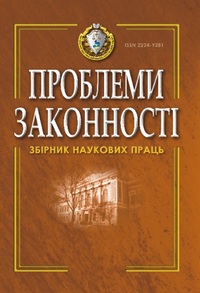Expert and legal expert as participants of administrative process
Expert and legal expert as participants of administrative process
Author(s): Iryna Nesterova, Nataliya SheleverSubject(s): Law, Constitution, Jurisprudence, Administrative Law
Published by: Національний юридичний університет імені Ярослава Мудрого
Keywords: expert; legal expert; administrative process; participant in the administrative process; expert’s opinion;
Summary/Abstract: In connection with Ukraine’s European integration intentions, there is a need to update the procedural codes. The new Code of Administrative Procedure contains numerous novelties, in particular, the range of other participants in the trial has been expanded. This issue is relevant given the role of experts in the trial.The Code of Administrative Procedure defines the legal status of an expert whose task is to promote effective justice. For the court, its opinion is of a recommendatory nature, because the final decision is made by the judge. A novelty of the Code of Administrative Procedure is that the participants in theprocess have the right to provide an expert opinion and such an opinion is equivalent to the opinion of an expert appointed by the court. In our opinion, such a novelty is a positive step forward. It should be noted that it is due to the expertise special knowledge is used and public legal disputes are effectively resolved. It is the expert who uses scientific and technical means to establish the circumstances that are relevant to the trial and thus promotes effective justice.A new participant in the administrative process is a legal expert. The Code of Administrative Procedure of Ukraine determines the procedural status of this participant. This must be a person who has a scientific degree and is a recognized specialist in the field of law. However, the Code of Administrative Procedure of Ukraine does not specify which scientific degree it should be. This should be either a candidate of law or a doctor of law. In addition, the legal structure of “recognized specialist in the field of law” is debatable. The Code of Administrative Procedure of Ukraine gives the participants the right to submit to the court the opinion of such an expert.It should be noted that the opinion of a legal expert is not evidence, is ancillary in nature and is not binding on the court. The judge’s task is to draw an independent conclusion in fact. A legal expert does not replace a judge. However, in its decision, the court may refer to the opinion of a legal expert as a source of information that is contained therein.The legal expert provides an opinion on a limited list of issues. However, judges have difficulties with the application of the analogy of law and norms of foreign law. Ultimately, this leads to a review and reversal of a judgment. Therefore, we consider that legal experts should be highly professional scholars who are able to provide effective assistance to judges in public legal disputes resolving.Some practitioners consider that it is important for the court not only to have the opinion of a scientist, but also a lawyer-practitioner, who, although he does not have a scientific degree, but has practical experience and can provide appropriate recommendations for public legal disputes resolving. We do not agree with this opinion, as we consider that only a scientist can provide qualified assistance to a judge in public legal dispute resolving. Instead, a legal practitioner should make recommendations for a judge to resolve a relevant public legal dispute.It is advisable to expand the circle of other participants in the trial. Both the expert and the legal expert contribute to the rule of law principles in the administration of justice
Journal: Проблеми законності
- Issue Year: 2021
- Issue No: 152
- Page Range: 69-78
- Page Count: 10
- Language: English

